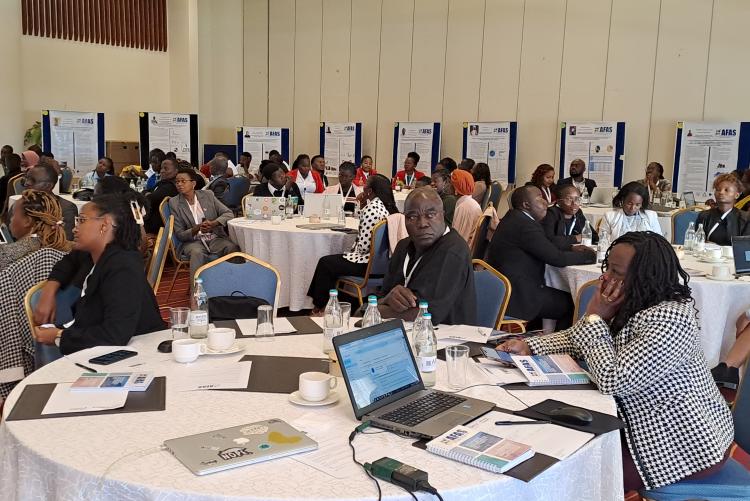On the 14th of December 2023, the Mövenpick Hotel in Nairobi, Kenya, played host to the AFAS Stakeholder Workshop. Under the theme "Achieving Profitable Nature-based Solutions for Climate Change Adaptation and Biodiversity Conservation," the workshop aimed to unite policy makers, businesses, NGOs, and scientists involved in Nature-based Solutions (NbS) for climate change adaptation and biodiversity protection in East African savanna regions.
The workshop had three primary objectives. First, it sought to strengthen the network of stakeholders engaged in NbS, fostering collaboration among policy makers, businesses, NGOs, and scientists. Second, it aimed to facilitate the sharing of experiences and recommendations on making NbS profitable for businesses and achieving financial independence for NbS activities of governmental and non-governmental organizations. Lastly, the workshop aimed to connect AFAS students with individual stakeholders for customized master education, research projects, internships, and mentoring opportunities, creating a symbiotic relationship benefiting both students and host organizations.
Professor Olago, the Chair of the Department of Earth Climate Sciences, presented an insightful progress report and outputs of AFAS. He highlighted the center's focus on climate change adaptation and biodiversity conservation in African savannas. Notably, he delved into the concept of Nature-based Solutions (NbS), emphasizing actions to protect, conserve, and sustainably manage terrestrial, freshwater, coastal, and marine ecosystems. These actions, he noted, effectively address social, economic, and environmental challenges while providing benefits in human well-being, ecosystem services, resilience, and biodiversity.
Professor Olago also commended the active participation of AFAS students in NbS network forums since September 2022, showcasing the center's commitment to addressing environmental challenges through innovative and sustainable approaches. The outcomes presented included the qualification of the center's graduates for the local and international employment market in climate protection and environmental conservation. Additionally, the networking initiatives facilitated joint research endeavors, creating synergy effects and improved visibility for AFAS.
Representing the Vice-Chancellor, Professor Hutchinson emphasized the establishment and purpose of AFAS as one of the DAAD Global Centres for Climate and Environment. Founded in May 2021, AFAS is dedicated to Nature-based Solutions, addressing climate change adaptation and biodiversity conservation through interdisciplinary and international exchanges within the Science-Policy-Practice-Interface (SPPI). The Vice-Chancellor's speech underscored the significance of African savannas, covering 43% of the continent and housing 40% of Africa's population. These savannas contribute significantly to biodiversity, tourism income, and national GDPs.
The speech highlighted AFAS's commitment to international collaboration, bridging the francophone-anglophone divide and involving lead institutions in West and East Africa, Germany, and various stakeholders. AFAS aligns with the University of Nairobi's goals, focusing on SPPIs, interdisciplinary research, and stakeholder engagement to address the threats posed by population growth, anthropogenic pressures, and climate change.
Ms. Margaret Kirai, Acting Director of DAAD Africa, acknowledged the role of AFAS in addressing climate change and biodiversity conservation. She noted that over 45,000 students in East Africa had been granted scholarships by DAAD and emphasized the crucial need for science and research in tackling these issues.
Ms. Juliane Kabus, Climate Affairs representative from the German Embassy, expressed the office's dedication to promoting biodiversity and climate change mitigation, aligning with Sustainable Development Goals (SDGs).
In a dynamic session, 20 students from cohorts 1 and 2, comprising PhD and Master's students, presented their research findings, showcasing the practical applications of AFAS's initiatives.
In conclusion, AFAS, as the African Climate and Environment Center, stands at the forefront of addressing climate change and biodiversity conservation in African savannas. With its strong network, focus on Science-Policy-Practice Interfaces, and commitment to digital research and capacity building, AFAS is poised to make lasting contributions to the preservation of the environment and sustainable development. The workshop provided a platform for collaboration, sharing of experiences, and the cultivation of future leaders in the field. As the Stakeholder Forum officially opened, participants expressed anticipation for collaborative efforts that would lead to improved livelihoods through Nature-based Solutions.

